- Weekly Highlights from Arakan State (Feb 2 to 8, 2026)
- Arakanese merchants seek access to Indian market via Mizoram trade route
- Education crisis deepens for IDP children in Arakan State
- Coalition forced led by AA advances toward junta No. 16 weapons factory in Bago Region
- A Glimpse Into the 2026 Arakan State Parliament
Rehabilitating Arakan State in Cyclone Mocha’s Aftermath
07 Jun 2023
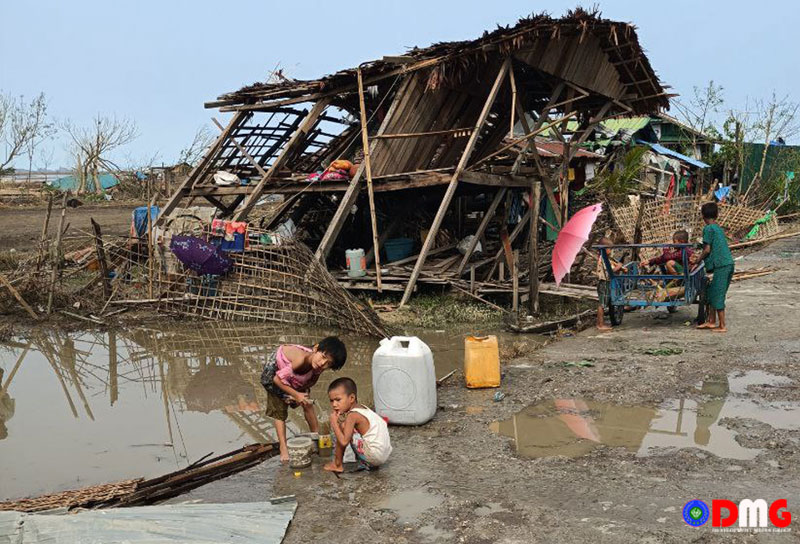
Written By Maung Khaing Tun (Pyi Thit)
The devastating cyclone that hit Arakan State on May 14 inflicted massive property damage in Sittwe, Pauktaw, Rathedaung, Ponnagyun, Minbya, Kyauktaw, Mrauk-U and Buthidaung townships of northern Arakan State. The storm caused human casualties while also killing thousands of cattle crucial for rural communities dependent on farming. Thousands of acres of crops were decimated.
Fortunately, the storm made landfall during the daytime and heavy casualties were avoided. Had it raged at nighttime, it could have caused death and destruction on a scale not seen in Myanmar since Cyclone Nargis claimed the lives of more than 130,000 people in May 2008.
Heavy casualties could be avoided in the face of Cyclone Mocha thanks to social media, an evacuation plan by the Arakan People’s Authority, and preparations by the junta’s Arakan State-level military council. But property damage could not be avoided.
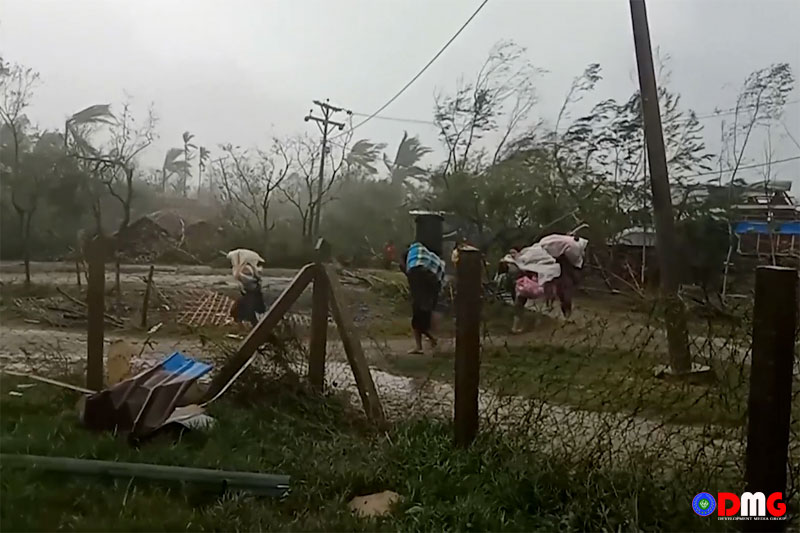
Some 70 percent of houses were damaged by the storm, and in the six townships that were hit hardest, some 30 percent of houses were completely destroyed, according to the Arakan Army (AA).
Practically all the lakes that supply drinking water in almost all the storm-hit villages were contaminated with saltwater. And people still need drinking water and shelter in many parts of Arakan State. The AA has been regularly updating its list of damages in the respective townships.
Civil society organisations, international organisations and charities have been actively helping the affected communities, but relief aid has yet to reach all the storm-hit areas. International organisations still can’t deliver large amounts of supplies, and storm victims are still suffering from the humanitarian crisis. All the stakeholders are working hard to ease the crisis.
AA Relief Efforts
The AA and its political wing, the United League of Arakan (ULA), established the Arakan People’s Authority in early 2023, and it now controls much of rural Arakan State. In the aftermath of the cyclone, the Cyclone Mocha Emergency Rescue and Rehabilitation Committee for Arakan (ERRCA) was created with the AA deputy military chief serving as its chairman.
The AA military chief has also urged international organisations and civil society organisations to help storm victims. He has urged them to coordinate with the Humanitarian and Development Coordination Office (HDCO) formed by the ULA to make sure rescue and relief efforts can be executed in a timely manner. HDCO is taking a lead role in delivering food supplies to storm-hit areas.
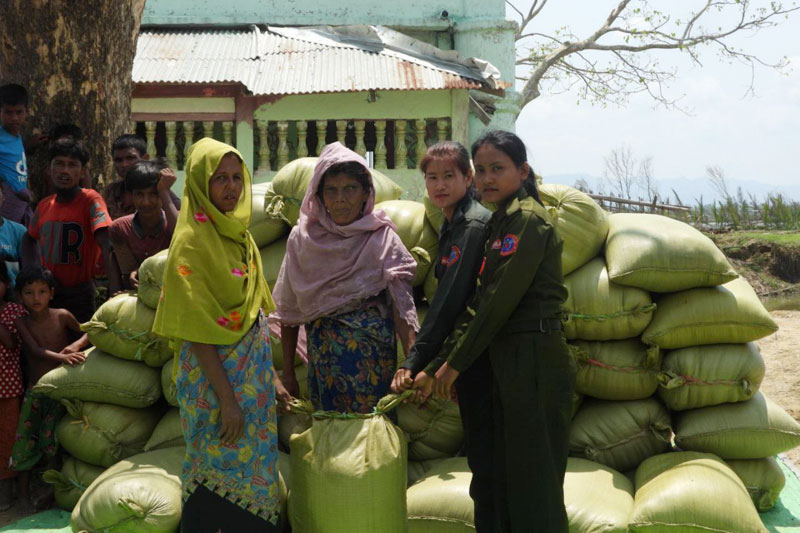
The AA has been continuously helping storm victims by cleaning up debris on streets and bridges, and cleaning lakes. It is also working to provide emergency food supplies and healthcare services. Fellow revolutionary organisations have also made cash donations for storm victims in Arakan State through the AA. With few exceptions, the public is cooperating with the AA in its relief operations.
Regime Relief Efforts
Junta chief Min Aung Hlaing came to Sittwe the day after the storm hit, and reportedly handed over 7 billion kyats for rescue and relief operations. On May 18, the regime assigned one lieutenant-general or brigadier-general to each of the 14 storm-hit townships to spearhead rehabilitation efforts. The regime is carrying out relief operations and sells foods at lower prices in towns it controls, but the public is barely cooperating with it.
The regime is mainly working to resume electricity supply in storm-hit townships, and has not yet tried to deliver food supplies to storm-hit communities in remote rural areas. The junta’s assistance should reach the areas that most need humanitarian supplies.
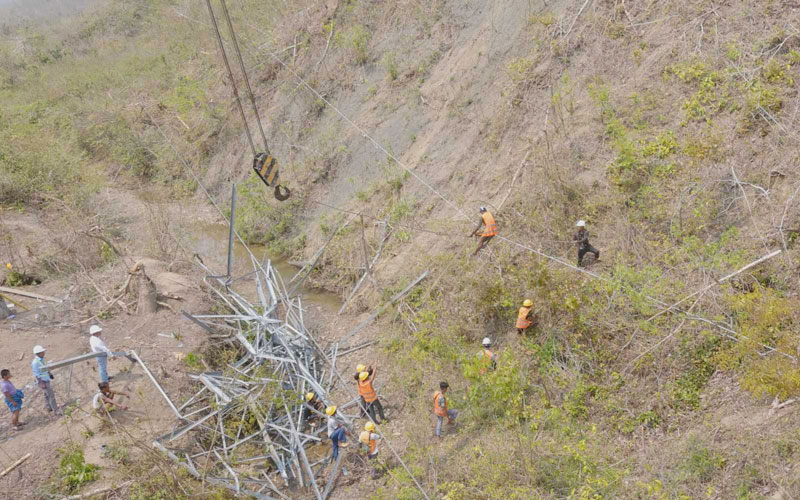
It cannot be denied that the military junta has the background to do more in the emergency relief and rehabilitation efforts needed in post-cyclone Arakan State. Making matters worse, the regime has restricted the aid of international organisations and has established a policy that donations must flow through the state government, making the crisis worse for those who are really suffering.
More than 15 days after the storm hit Arakan State, the military junta has only been working in the relatively easy operating theatres. As the actions of the junta are not aligned with the needs of the people, it is certain that the actual needs of the people have not yet been met. The K7 billion allocated by the junta for people affected by the cyclonic storm seems to be used only for the country’s infrastructure, which is not the most immediate of needs.
Recovery Plans Needed Without Delay
In Arakan State, full onset of the rainy season is imminent. The fact that a period of some two weeks of relatively rain-free weather followed Cyclone Mocha was a blessing; an opportunity for the people affected by the storm to regroup. But food supplies still have not reached all areas in need, and there is an urgent need to repair or replace damaged shelters and homes.
The military junta must not limit the actions of international organisations and local civil society organisations to help storm victims. The junta should invite international organisations to help storm victims and encourage civil society organisations to cooperate. After the 30-day emergency period, the military junta must carry out systematic reconstruction work, conduct specific surveys and establish specific rehabilitation policies.
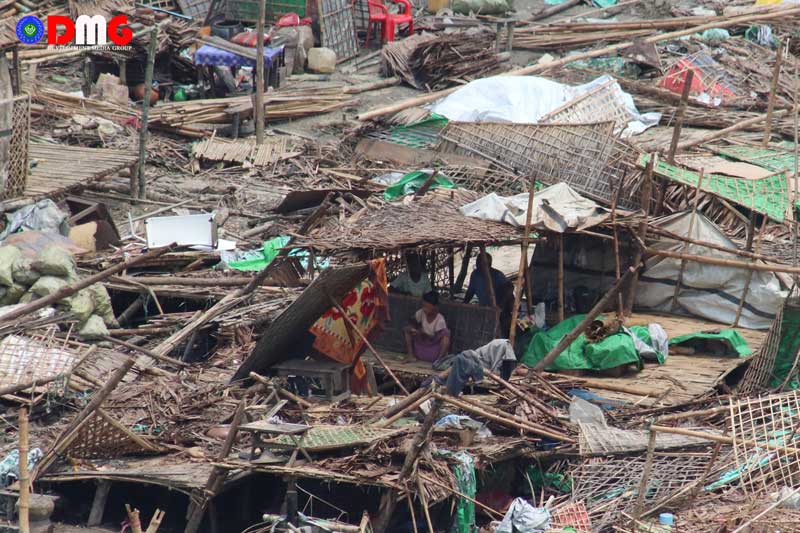
It is not easy to do the reconstruction work Arakan State needs without international help. Therefore, the military junta should open the way for international organisations to help the storm victims and should be allowed to work freely. International organisations can make preparations for the recovery of the people affected by the disaster. Only if we can work to get international aid delivered quickly will the people affected by the disaster in Arakan State be able to breathe a little easier.
Now is not the time to argue politically or militarily in Arakan State, where there are two governments. The free flow of humanitarian aid is paramount at this time.
The junta should focus on the plight of the people who are in real trouble, and ask for international help. The monsoon will soon be upon Arakan State. Now is the time to act, before the negative health impacts of poorly housed communities set in with the rains.






.jpg)













